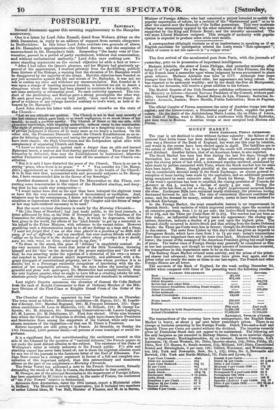The Chamber of Deputies appointed its four Vice-Presidents on Thursday.
The votes stood as follows: Ministerial candidates—M. Bignon, 217; M. Lepelle- tier d'Aulnay, 210; Marshal Bugeand, 206; M. Francois Delessert, 195: Oppo- sition candidates—M. Leon de Walleville, 112; M. Billault, 110; M. George La- fayette, 86; N. Abatucci, 85: Dissenting Conservatives—M. Lacave Laplagne, .50; N. Lanver, 69; M. Debelleyme, 27. First four elected. Of the nine bureaux into which the Chamber of Deputies is divided, eight have chosen their Presidents and Secretaries from among the supporters of the Cabinet, while only one has chosen members of the Opposition—of that one DL Thiers is President. Reform banquets are still going on in France. At Grenoble, on Sunday the 19th December, 1,000 persons dined,—all persons of some municipal or social im- portance.
It is a significant fact, that notwithstanding the excitement created on this side of the Channel by the question of "national defences," the French papers do not make the most distant allusion to the subject. The existence of the Duke of Wellington's letter is utterly unknown to the French public. P.'s able and startling exposé has never been heard of; nor is there the slightest allusion made by any one of the journals to the luminous letter of the Earl of Ellesmere. Per- haps there cannot be a stronger argument in favour of a fall and complete exa- mination of this important subject, than this extraordinary and unanimous silence on the part of our neighbonrs.—Morning Chronicle.
The Swiss Vorort has addressed a note to the French Government, formally demanding the recall of M. Bois Is Comte, the Ambassador in that country.
M. Desages, one of the principal Secretaries in the department of Foreign Affairs, has been appointed by N. Gnizot to attend, in the name of France, the conference of" the Four Powers "relative to Switzerland.
Accounts from Amsterdam, dated the 28th instant, report a Ministerial crisis in Holland. The Ministry is strictly Conservative; but it included two members of rather Liberal ideas, M. Van Hall, Minister of Finance, and M. de la Sarraz,
Minister of Foreign Affairs; who had conceived a project intended to satisfy the popular expectation of reform, by a revision of the fundamental pact" so as to alter the control over the finances of the Indian possessions. This very moderate change was strenuously opposed by the other members of the Cabinet; who were supported by the King and Princes Royal; and the minority succumbed. The two more Liberal Ministers resigned. This struggle of authority with popular opinion is expected to produce some crisis next month.






























 Previous page
Previous page